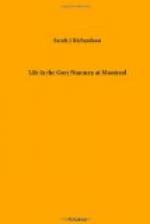Being asked, according to custom, whether he had any enemies, and desired to name them, he answered, that he bore enmity to no man, and he hoped no man bore enmity to him. For, as in the Inquisition the person accused is not told of the charge brought against him, nor of the person by whom it is brought, the inquisitor asks him if he has any enemies, and desires him to name them. If he names the informer, all further proceedings are stopped until the informer is examined anew; and if the information is found to proceed from ill-will and no collateral proof can be produced, the prisoner is discharged. Of this piece of justice they frequently boast, at the same time that they admit, both as informers and witnesses, persons of the most infamous characters, and such as are excluded by all other courts. In the next place, the prisoner is ordered to swear that he will declare the truth, and conceal nothing from the holy tribunal, concerning himself or others, that he knows and the holy tribunal desires to know. He is then interrogated for what crime he has been apprehended and imprisoned by the Holy Court of the Inquisition, of all courts the most equitable, the most cautious, the most merciful. To that interrogatory the count answered, with a faint and trembling voice, that he was not conscious to himself of any crime, cognizable by the Holy Court, nor indeed by any other; that he believed and ever had believed whatever holy mother church believed or required him to believe. He had, it seems quite forgotten what he had unthinkingly said at the sight of the two friars. The inquisitor, therefore, finding that he did not remember or would not own his crime, after many deceitful interrogatories, and promises which he never intended to fulfil, ordered him back to his dungeon, and allowing him another week, as is customary in such cases, to recollect himself, told him that if he could not in that time prevail upon himself to declare the truth, agreeably to his oath, means would be found of forcing it from him; and he must expect no mercy.
At the end of the week he was brought again before the infernal tribunal; and being asked the same questions, returned the same answers, adding, that if he had done or said anything amiss, unwittingly or ignorantly, he was ready to own it, provided the least hint of it were given him by any there present, which he entreated them most earnestly to do. He often looked at me, and seemed to expect—which gave me such concern as no words can express—that I should say something in his favor. But I was not allowed to speak on this occasion, nor were any of the counsellors; and had I been allowed to speak, I durst not have said anything in his favor; the advocate appointed by the Inquisition, and commonly styled, “The Devil’s Advocate,” being the only person that is suffered to speak for the prisoner. The advocate belongs to the Inquisition, receives a salary from the Inquisition, and is bound by an oath to abandon the defence of the prisoner, if be undertakes it, or not to undertake it, if he finds it cannot be defended agreeably to the laws of the Holy Inquisition; go that the whole is mere sham and imposition. I have heard this advocate, on other occasions, allege something in favor of the person accused; but on this occasion he declared that be had nothing to offer in defence of the criminal.




